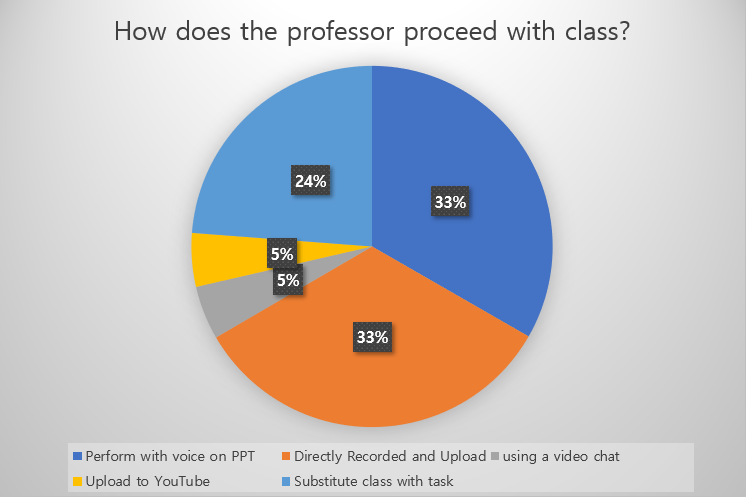Student Opinions on Remote Classes
With concerns spreading about COVID-19, on February 7 the Ministry of Education recommended that all universities nationwide postpone the start of their classes in March. On March 2, the Education Ministry issued a recommendation for the first semester of 2020 regarding online classes for the first two to four weeks of the semester.
The Ministry of Education said, "Although the start of school has been postponed for two weeks, we decided to offer classes at home, such as remote classes and task utilization classes, as an alternative to attending classes in person. Online classes will be offered until the COVID-19 situation stabilizes."

▲ Listening to online lectures in a remote class
The schedule for remote classes is being shared on Changwon University's Wagle website, class home pages, and the student council's SNS. To ensure smooth progress, students at Changwon University can check the status of course openings through the "e-class" site. Detailed information on virtual lectures (100% online), blended lectures, and classes held by guest lecturers can be found on the notice board.
The English-language newspaper conducted a survey of students at Changwon University who were taking remote classes from March 17 to March 21 to hear their opinions on online classes. The first survey question was about how remote classes are being held.
 ▲ Results of the survey on how the professors hold their classes
▲ Results of the survey on how the professors hold their classes
This is a pie graph showing the findings of the survey on how the students' remote classes were being held. (These results are difficult to generalize.) ‘Audio lesson with PPT’, and ‘recorded and uploaded lessons’ accounted for the highest number of responses at 33.3%. After that, 24% of survey respondents said they had tasks instead of classes. Following, replaced by task instead of classes accounted 24%. Outside of that, uploading lectures to YouTube and other alternatives (such as uploading documentaries) accounted for 5 percent each.
The second survey question looked at the student satisfaction level of the remote classes.
The results were 'very satisfactory' (35 percent), 'satisfied' (10 percent), 'neutral' (35 percent), and 'dissatisfied' (20 percent). Students gave their opinions on the quality of their online lessons.
Choi Seung-hwa, an accounting major, said, "Of all my classes that have been replaced with remote classes, there have been more classes that gave me assignments than lectures. There have been many problems, such as the audio in the lecture videos being too quiet to be heard. And problems caused by too many connections also affected the quality and satisfaction of online classes." On the other hand, some students said that they were satisfied because there was no strict time to attend the lecture and that they were free to review it at any time.
The following table lists the pros and cons of online lectures according to student responses.
|
The Pros and Cons of Online Classes |
|
|
Pros |
Cons |
|
Flexible in time and location |
Some professors are not uploading a lecture video, and just replaced it with assignments. |
|
Students can pause lessons and listen again when they don't understand or to take notes |
The quality of lectures is lower than in-person lectures and there are too many assignments |
|
People who have a long commute to school can listen to lectures comfortably at home |
Students can't ask questions and receive answers right away when they don't understand something |
|
No need to worry about wearing face masks |
Sometimes the video and audio are not in synch, there are also many errors and online congestion |
Zhang Harin, a Chinese student, said, "It's necessary to set them [online lessons] up based on the progress of learning and make sure the book is ready." Kang Ye-jin, a student at the Department of Journalism & Mass communication, said, "We want professors to regulate the amount of assignments. Students are in a hurry to do their homework and feel a lot of pressure because they are not just taking one class. And I hope the school has prepared a plan for the worst case scenario."
Efforts should be made to improve the online study environment in schools based on the feedback from students, such as looking for ways to improve the ratio of class assignments to lectures. Students also need to make efforts to read and follow the notices made by the school.
Looking at the data from the Center for Disease Control and Prevention's central quarantine task force, the risk of people in their 20s acting as an infectious agent is very high. The prevention of catching and transmitting COVID-19 is important, so people should actively participate in social distancing. Depending on the situation, in-person classes can be postponed or substituted with remote classes. Be considerate of others, practice good hygiene, and look forward to the reopening of regular classes in the near future.

▲ The Current Situation of COVID-19 in Korea
(source of statistic: central disaster and safety countermeasures headquarters, http://ncov.mohw.go.kr/ )
By Kim Seong Ju, cub-reporter
By Kim Seong Ju, cub-reporter nicole0215@naver.com
<저작권자 © The Campus Journal, 무단 전재 및 재배포 금지>

 Shrinkflation, Consumer Deception
Shrinkflation, Consumer Deception




